【高考复习方案】2015届高考二轮复习课件(专题导读+真题典例+新题预测):专题十三 情景交际(共38张PPT)
文档属性
| 名称 | 【高考复习方案】2015届高考二轮复习课件(专题导读+真题典例+新题预测):专题十三 情景交际(共38张PPT) | 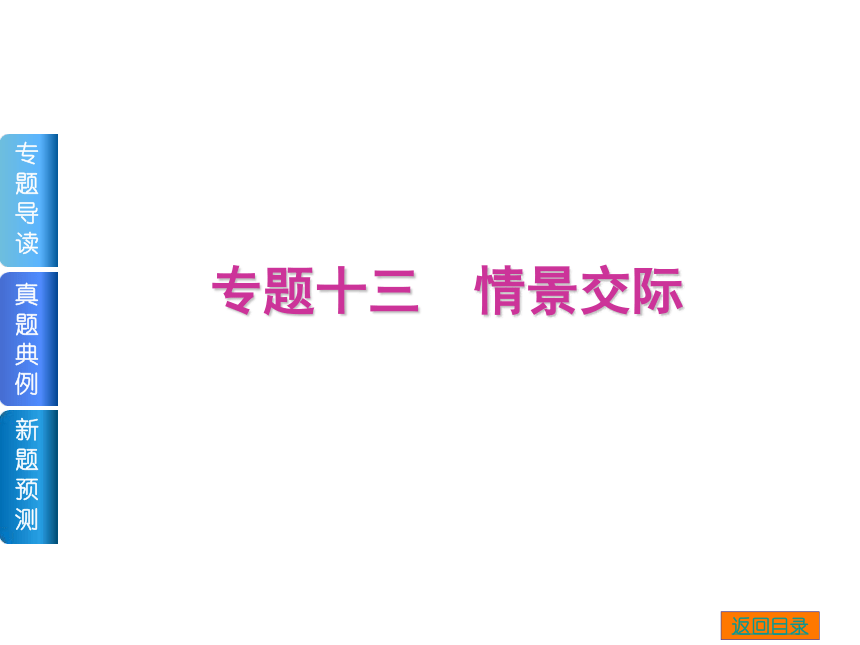 | |
| 格式 | zip | ||
| 文件大小 | 75.6KB | ||
| 资源类型 | 教案 | ||
| 版本资源 | 通用版 | ||
| 科目 | 英语 | ||
| 更新时间 | 2015-05-28 17:36:27 | ||
图片预览

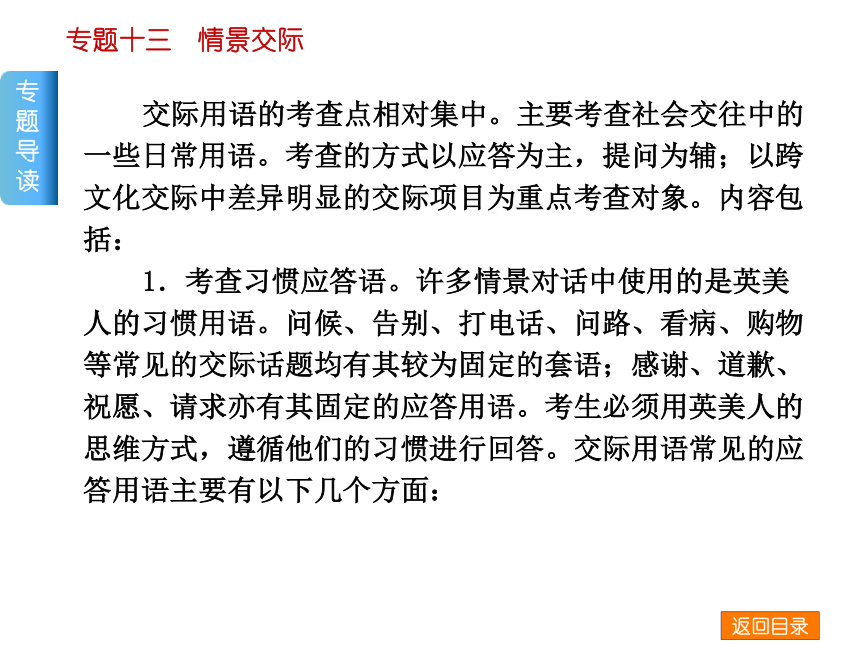

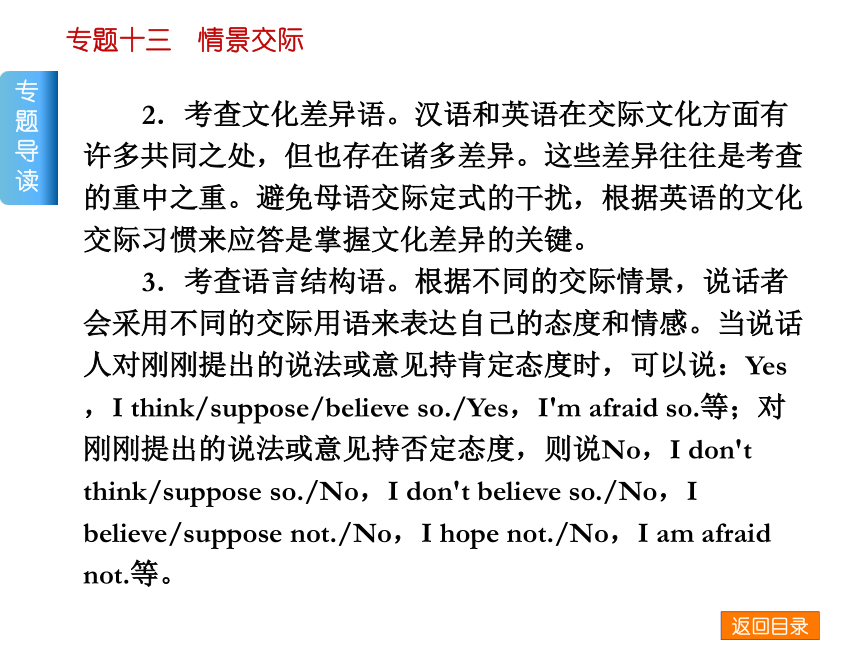
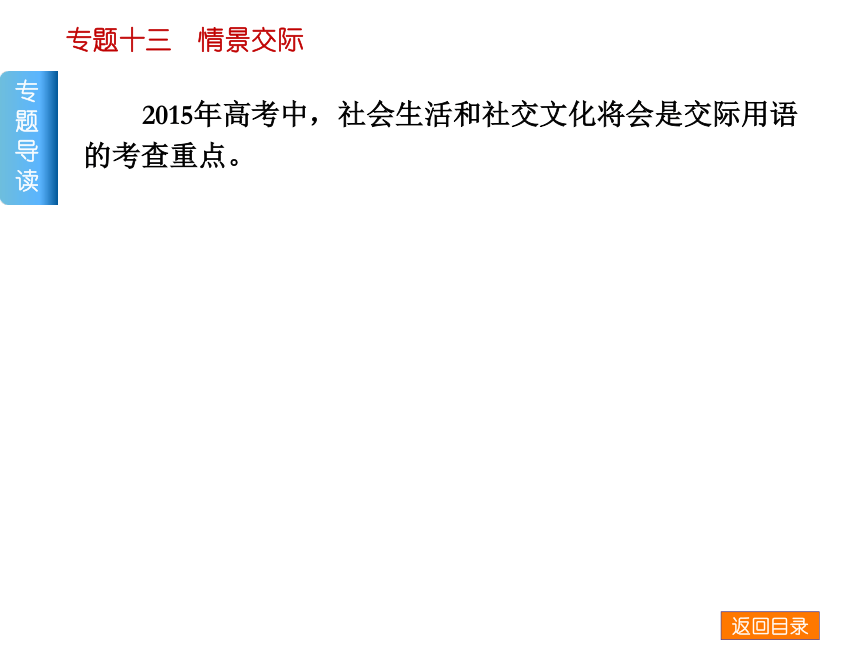
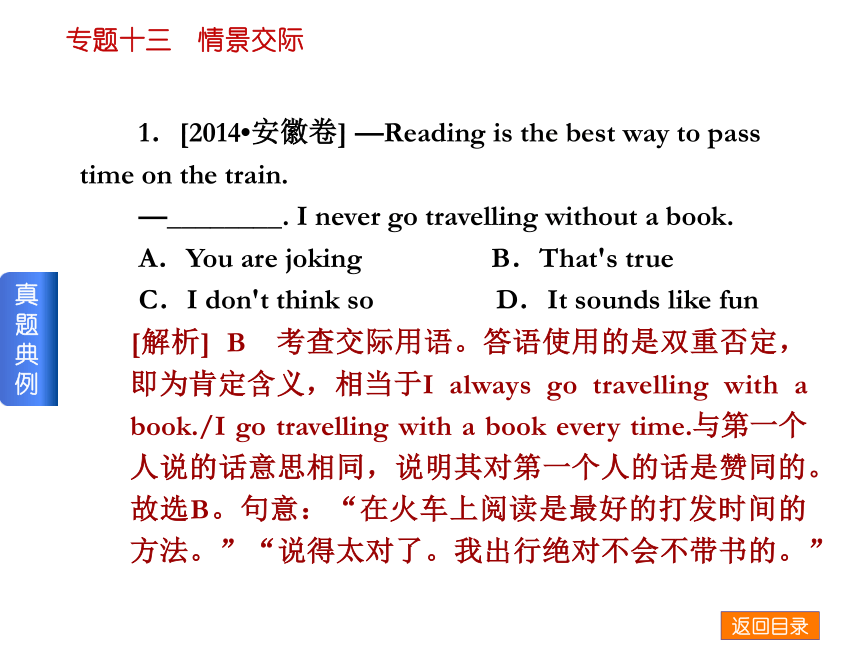
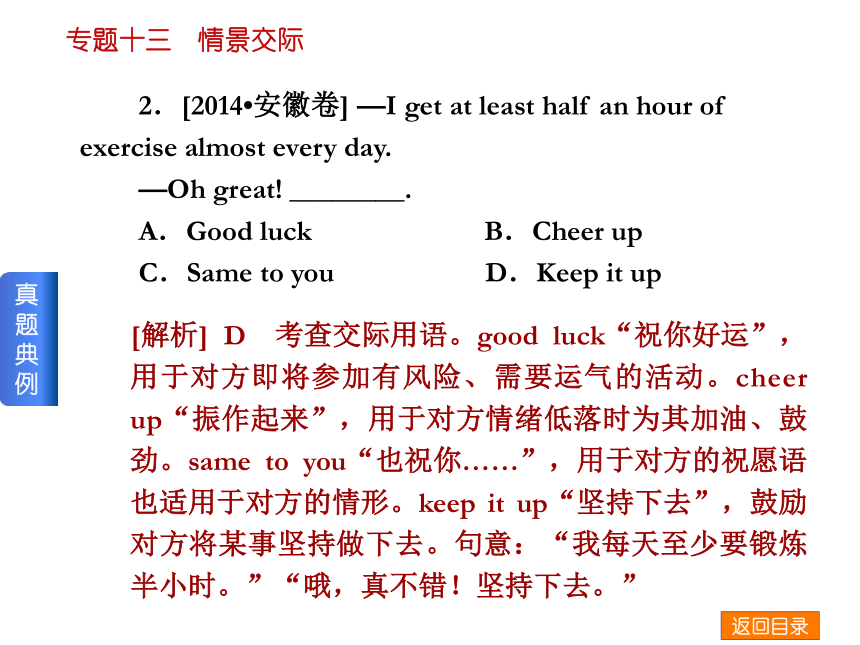

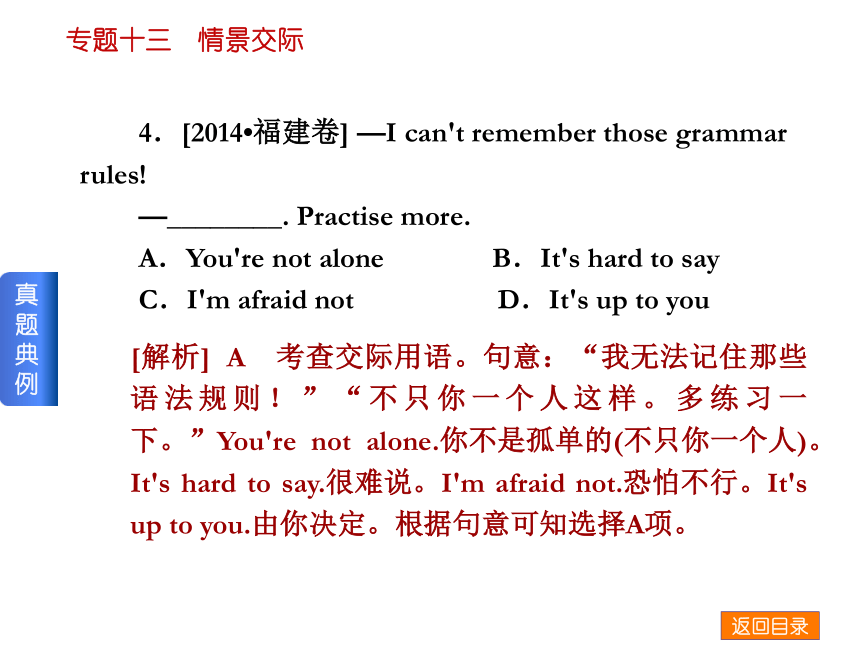
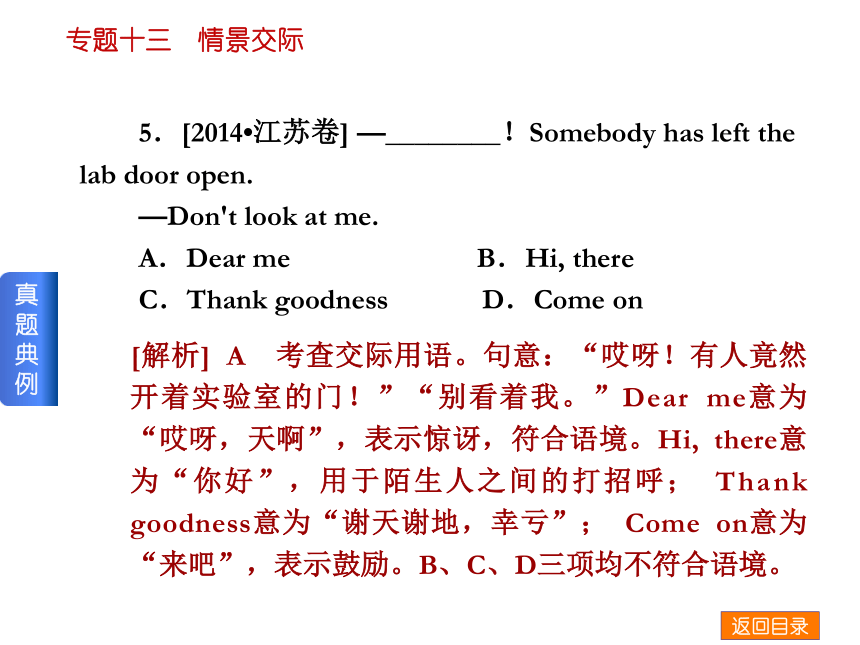
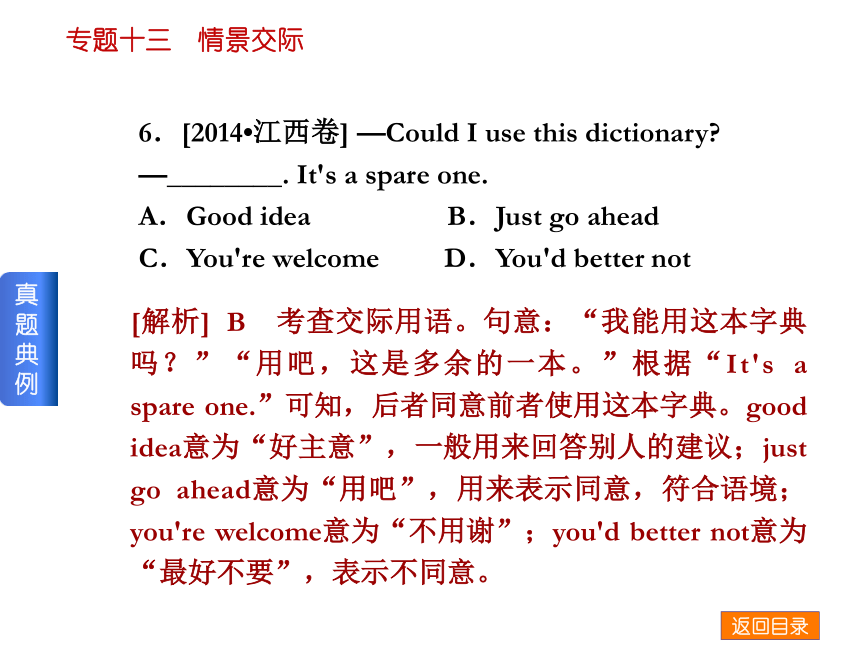
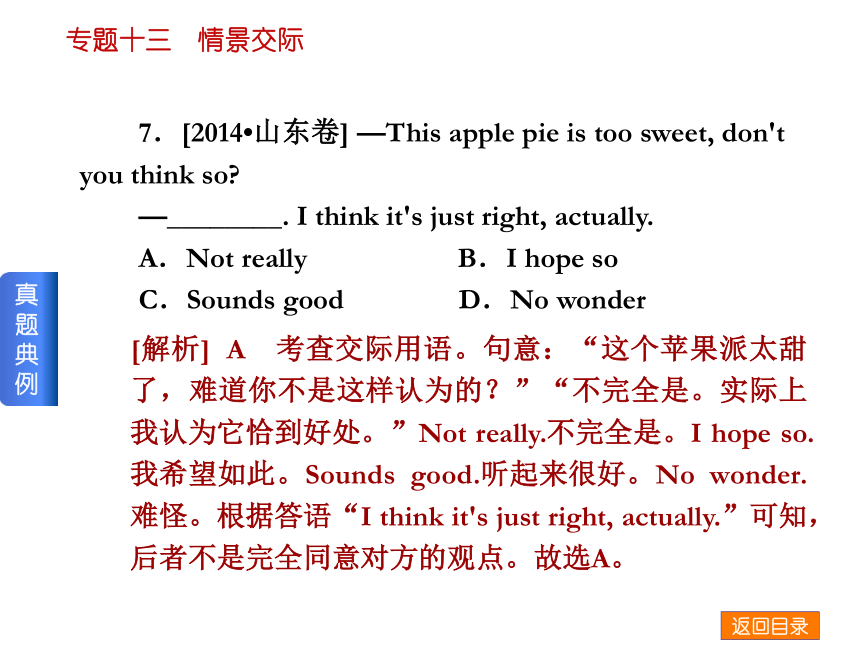
文档简介
课件38张PPT。专题十三 情景交际专
题
导
读真
题
典
例
新
题
预
测返回目录专题十三 情景交际交际用语的考查点相对集中。主要考查社会交往中的一些日常用语。考查的方式以应答为主,提问为辅;以跨文化交际中差异明显的交际项目为重点考查对象。内容包括:
1.考查习惯应答语。许多情景对话中使用的是英美人的习惯用语。问候、告别、打电话、问路、看病、购物等常见的交际话题均有其较为固定的套语;感谢、道歉、祝愿、请求亦有其固定的应答用语。考生必须用英美人的思维方式,遵循他们的习惯进行回答。交际用语常见的应答用语主要有以下几个方面:返回目录专
题
导
读(1)常用于接受或拒绝请求、邀请的应答用语有With pleasure./Yes,help yourself./No problem./Good idea./Why not?/Sorry, but…/ I'd rather you…/ Thank you, but…/ No way./ Forget it.等。(2)常用于感谢的应答用语有That's all right./ You are welcome./ Don' mention it./ It is my pleasure./ My pleasure./ Not at all.等。 (3)常用于道歉的应答用语有Never mind./ It doesn't matter./ Not at all./ That's all right./ That is nothing.等。(4)常用于祝愿和祝贺的应答用语有Good luck./ Best wishes to you./ Have a nice time./ Congratulations./ Merry Christmas./ Thank you./ The same to you.等。返回目录专题十三 情景交际专
题
导
读2.考查文化差异语。汉语和英语在交际文化方面有许多共同之处,但也存在诸多差异。这些差异往往是考查的重中之重。避免母语交际定式的干扰,根据英语的文化交际习惯来应答是掌握文化差异的关键。
3.考查语言结构语。根据不同的交际情景,说话者会采用不同的交际用语来表达自己的态度和情感。当说话人对刚刚提出的说法或意见持肯定态度时,可以说:Yes,I think/suppose/believe so./Yes,I'm afraid so.等;对刚刚提出的说法或意见持否定态度,则说No,I don't think/suppose so./No,I don't believe so./No,I believe/suppose not./No,I hope not./No,I am afraid not.等。返回目录专题十三 情景交际专
题
导
读2015年高考中,社会生活和社交文化将会是交际用语的考查重点。返回目录专题十三 情景交际专
题
导
读返回目录专题十三 情景交际真
题
典
例
1.[2014?安徽卷] —Reading is the best way to pass time on the train.
—________. I never go travelling without a book.
A.You are joking B.That's true
C.I don't think so D.It sounds like fun[解析] B 考查交际用语。答语使用的是双重否定,即为肯定含义,相当于I always go travelling with a book./I go travelling with a book every time.与第一个人说的话意思相同,说明其对第一个人的话是赞同的。故选B。句意:“在火车上阅读是最好的打发时间的方法。”“说得太对了。我出行绝对不会不带书的。”返回目录专题十三 情景交际真
题
典
例
2.[2014?安徽卷] —I get at least half an hour of exercise almost every day.
—Oh great! ________.
A.Good luck B.Cheer up
C.Same to you D.Keep it up[解析] D 考查交际用语。good luck“祝你好运”,用于对方即将参加有风险、需要运气的活动。cheer up“振作起来”,用于对方情绪低落时为其加油、鼓劲。same to you“也祝你……”,用于对方的祝愿语也适用于对方的情形。keep it up“坚持下去”,鼓励对方将某事坚持做下去。句意:“我每天至少要锻炼半小时。”“哦,真不错!坚持下去。”返回目录专题十三 情景交际真
题
典
例
3.[2014?全国大纲卷] —I'm sorry for breaking the cup.
—Oh, ________—I've got plenty.
A.forget it B.my pleasure
C.help yourself D.pardon me[解析] A 考查交际用语。句意:“对不起,我打碎了你的杯子。”“噢,没关系。我还有很多呢。”此处forget it意为“得了吧,算了吧,没关系”。根据句意可知选A。返回目录专题十三 情景交际真
题
典
例
4.[2014?福建卷] —I can't remember those grammar rules!
—________. Practise more.
A.You're not alone B.It's hard to say
C.I'm afraid not D.It's up to you[解析] A 考查交际用语。句意:“我无法记住那些语法规则!”“不只你一个人这样。多练习一下。”You're not alone.你不是孤单的(不只你一个人)。It's hard to say.很难说。I'm afraid not.恐怕不行。It's up to you.由你决定。根据句意可知选择A项。返回目录专题十三 情景交际真
题
典
例
5.[2014?江苏卷] —________!Somebody has left the lab door open.
—Don't look at me.
A.Dear me B.Hi, there
C.Thank goodness D.Come on[解析] A 考查交际用语。句意:“哎呀!有人竟然开着实验室的门!”“别看着我。”Dear me意为“哎呀,天啊”,表示惊讶,符合语境。Hi, there意为“你好”,用于陌生人之间的打招呼; Thank goodness意为“谢天谢地,幸亏”; Come on意为“来吧”,表示鼓励。B、C、D三项均不符合语境。返回目录专题十三 情景交际真
题
典
例
6.[2014?江西卷] —Could I use this dictionary?
—________. It's a spare one.
A.Good idea B.Just go ahead
C.You're welcome D.You'd better not[解析] B 考查交际用语。句意:“我能用这本字典吗?”“用吧,这是多余的一本。”根据“It's a spare one.”可知,后者同意前者使用这本字典。good idea意为“好主意”,一般用来回答别人的建议;just go ahead意为“用吧”,用来表示同意,符合语境;you're welcome意为“不用谢”;you'd better not意为“最好不要”,表示不同意。 返回目录专题十三 情景交际真
题
典
例
7.[2014?山东卷] —This apple pie is too sweet, don't you think so?
—________. I think it's just right, actually.
A.Not really B.I hope so
C.Sounds good D.No wonder[解析] A 考查交际用语。句意:“这个苹果派太甜了,难道你不是这样认为的?”“不完全是。实际上我认为它恰到好处。”Not really.不完全是。I hope so.我希望如此。Sounds good.听起来很好。No wonder.难怪。根据答语“I think it's just right, actually.”可知,后者不是完全同意对方的观点。故选A。返回目录专题十三 情景交际真
题
典
例
8.[2014?山东卷] —Is Anne coming tomorrow?
—________.If she were to come, she would have called me.
A.Go ahead B.Certainly
C.That's right D.I don't think so[解析] D 考查交际用语。句意:“安妮明天要来吗?”“我想她不会来的。如果她来的话,就给我打电话了。”根据句中的“…she would have called me.”可知安妮没有打电话,所以认为她不会来。Go ahead.干吧,前进。Certainly.当然可以,一定。That's right.对了。I don't think so.我不这样认为。故选D。返回目录专题十三 情景交际真
题
典
例
9.[2014?陕西卷] —I got that job I wanted at the public library.
—________! That's good news.
A.Go ahead B.Cheers
C.Congratulations D.Come on[解析] C 考查交际用语。Go ahead!请吧!继续!Cheers!干杯!Congratulations!祝贺你!Come on!来吧!加油!得了吧!根据答句的后一分句可知此处表示祝贺,故选C。返回目录专题十三 情景交际真
题
典
例
10.[2014?四川卷] —How about dinner tonight? It's on me.
—________.
A.You are welcome B.Oh, I'd like to
C.Well, I'm afraid so D.That's all right[解析] B 考查交际用语。You are welcome. 不客气,不用谢。I'd like to. 我愿意,我乐意。I'm afraid so. 恐怕是这样。That's all right. 不用谢,没关系。句意:“今晚一起吃饭怎么样?我请客。”“噢,我很乐意。”返回目录专题十三 情景交际新
题
预
测1.—Can you give me some advice on what major I should take at college?
—________. We can talk about it over lunch.
A.Never mind B.With pleasure
C.That depends D.It's out of the question[解析] B 考查交际用语。句意:“关于我在大学应该选修什么专业你能给我一些建议吗?”“很乐意。我们可以在午餐时讨论这个问题。”Never mind.没关系,别介意。With pleasure.乐意效劳。That depends.看情况吧。It's out of the question.不可能。语境表示接受请求,故选B项。返回目录专题十三 情景交际新
题
预
测 2.—________, the floor is really slippery.
—Thank you for reminding me.
A.Mind your step B.Walk slowly
C.Mind your feet D.Come this way[解析] A 考查交际用语。句意:“小心脚下,地板真的很滑。”“谢谢提醒。”Mind your step.注意脚下,小心脚下。Walk slowly.慢点儿走(中式表达)。Mind your feet.当心你的脚。Come this way.走这边。根据语境可知A项正确。返回目录专题十三 情景交际新
题
预
测3.—The scarf is nice, but the price is a little bit high.
—________ , but if you want good quality, you have to pay more.
A.No wonder B.No doubt
C.No offence D.No problem[解析] C 考查交际用语。句意:“这条围巾不错,但是价格有点儿高。”“无意冒犯,但是如果你想要质量好的东西就要多花钱。”No wonder.难怪。No doubt.毫无疑问。No offence.无意冒犯,不要见怪。No problem.没问题。根据语境可知C项正确。返回目录专题十三 情景交际新
题
预
测4.—I am so glad I caught you at home. I need your help!
—________, Robin?
A.What's up B.What else
C.How come D.Why not[解析] A 考查交际用语。句意:“真高兴能在家里找到你,我需要你的帮助。”“什么事儿,罗宾?”What's up?怎么了,什么事儿?What else?还有什么?How come?怎么可能?Why not?为什么不呢?根据语境可知A项正确。返回目录专题十三 情景交际新
题
预
测5.—Would you like me to make these calls for you?
—________I should have made them a while ago, but I have been at meeting all day.
A.I'd really appreciate it.
B.Thanks. I can manage it.
C.It's a piece of cake.
D.Take it easy, please.返回目录专题十三 情景交际新
题
预
测[解析] A 考查交际用语。句意:“你希望我帮你打这些电话吗?”“真的非常感谢。我本该早点儿打的,但是我一整天都在开会。”I'd really appreciate it.真的非常感谢。Thanks. I can manage it.谢谢,我自己可以应付。It's a piece of cake.小菜一碟。Take it easy, please.请放松。根据语境可知A项正确。返回目录专题十三 情景交际新
题
预
测6.—I really thought I'd win first prize.
—Oh,well, ________ , Tom.
A.that's all right B.best wishes
C.it's out of question D.better luck next time[解析] D 考查交际用语。句意:“我真的以为自己能得一等奖的。”“好吧,祝你下次更加好运,汤姆。”that's all right没关系,不用谢;best wishes祝福你;it's out of question没问题;better luck next time祝你下次更加好运。根据语境可知D项正确。返回目录专题十三 情景交际新
题
预
测7.—I have a good piece of news for you. Our team has won first place.
—________!I'll let everyone know it.
A.Fantastic B.Good luck
C.My pleasure D.Amusing[解析] A 考查交际用语。句意:“我有个好消息要告诉你。我们队得了第一。”“好极了,我要告诉每一个人。”Fantastic!好极了!Good luck!祝你好运!My pleasure!我的荣幸!Amusing!太搞笑了!根据语境可知A项正确。返回目录专题十三 情景交际新
题
预
测8.—So you gave her your phone?
—________. She said she'd return it to me when she could afford her own.
A.My pleasure B.Not exactly
C.No wonder D.All right[解析] B 考查交际用语。句意:“所以你把自己的电话送给她了?”“不完全是,她说她自己一买得起就把它还给我。”My pleasure.我的荣幸。Not exactly.不完全是,不准确。No wonder.难怪。All right.好的。根据语境可知B项正确。返回目录专题十三 情景交际新
题
预
测9.—Where on earth did you get the book?
—________
A.What did you say?
B.I beg your pardon?
C.Say it again.
D.I didn't get it on earth.[解析] B 考查交际用语。句意:“你到底哪里得来的这本书?”“请再说一遍好吗?”What did you say?你刚刚说什么(中式表达)?I beg your pardon?请再说一遍好吗?Say it again.再说一次(中式表达)。I didn't get it on earth.我终究不能明白它。根据语境可知B项正确。返回目录专题十三 情景交际新
题
预
测10.—Would you like to join us in the barbecue this Friday afternoon?
—Sorry, ________.
A.I'd love to B.I'll be tied up then
C.it all depends D.I'm not interested[解析] B 考查交际用语。句意:“这周五下午你想和我们一起去烧烤吗?”“对不起,我有事要忙。”I'd love to我愿意;I'll be tied up then“我那时会忙得不可开交”,是委婉的拒绝;it all depends视情况而定;I'm not interested我没兴趣。根据语境可知B项正确。返回目录 教师备用习题1.—Would you rather come on Friday or Saturday?
—________.
A.Yes, of course B.The other is better
C.That's OK D.Either would suit me[解析] D 考查交际用语。句意:“你想星期五来还是星期六来?”“随便哪一个都可以。”Yes, of course.是的,当然。The other is better.另外一个更好。That's OK.没关系。Either would suit me.随便哪一个都可以。根据句意可知D项正确。返回目录 教师备用习题2.—I've nothing on me except this ten-yuan note to donate, I'm afraid.
—Never mind.________. We really appreciate your assistance.
A.Every little helps
B.The more, the better
C.It's better to give than to receive
D.No one is perfect返回目录 教师备用习题[解析] A 考查交际用语。句意:“恐怕我什么也没带,除了这张面值为10元的纸币可以捐赠。”“没关系。涓涓细流汇成河。我们真的很感激你的帮助。”Every little helps.涓涓细流汇成河。The more, the better.越多越好。It's better to give than to receive.给予总比接受好。No one is perfect.人无完人。故选A项。返回目录 教师备用习题3.—Ella, ________, but your radio is going too loud.
—Oh, I'm sorry. I'll turn it down right now.
A.I‘d like to talk with you
B.I'm really tired of this
C.I hate to say it
D.I need your help[解析] C 考查交际用语。句意:“埃拉,我不想这么说,但是你的收音机太吵了。”“哦,对不起,我现在就把它的声音调低些。”I'd like to talk with you.我想和你谈谈。I'm really tired of this.我真的厌倦了。I hate to say it.我不想这么说。I need your help.我需要你的帮助。故选C项。返回目录 教师备用习题4.—What happened to Tony?
—________, but in brief, he has been arrested.
A.I've no idea B.You are kidding
C.It's a long story D.I'm sorry to hear that[解析] C 考查交际用语。句意:“托尼怎么了?”“说来话长,但是,简单地讲,他被逮捕了。”根据“…but in brief…”可知C项正确。返回目录 教师备用习题5.—How did your interview yesterday go?
—________!The questions were a bit difficult, but I answered them all.
A.Just so-so B.Terrible
C.Couldn't be better D.Hard to say[解析] C 考查交际用语。句意:“昨天你的面试情况怎么样?”“再好不过了,问题有点难,但是我都回答出来了。”根据“…I answered them all.”可知面试进行得很好。故C项正确。couldn't be better使用了否定词和比较级连用,表示最高级。返回目录 教师备用习题6.—It was really an exciting match yesterday. But you missed it.
—________.I got there ten minutes before it ended.
A.Not at all B.Not exactly
C.Not especially D.Not really[解析] B 考查交际英语。句意:“昨天的比赛真是令人兴奋。但是你错过了。”“没有完全错过。在它结束前的10分种我到了那里。”Not at all.一点儿也不。Not exactly.不完全是。Not especially.没有特别地。Not really.不是的(表示完全否定)。根据下文语境可知,“我”看到了部分比赛内容,所以“我”并没有完全错过。返回目录 教师备用习题7.—We really enjoy ourselves at the party. Thanks again, Mr and Mrs White.
—________. Just drop in whenever you feel like it.
A.With pleasure B.Have a good time
C.Go slowly D.Nice having you here返回目录 教师备用习题[解析] D 考查交际英语。句意:“在聚会上我们真的玩得很开心。再次感谢你们,怀特先生和太太。”“很高兴你们能来这里,你们想来的时候就来这里玩吧。”With pleasure.我的荣幸(答应对方做某事,事情还没有做)。 Have a good time.玩得开心。Go slowly.不符合英文表达。Nice having you here.很高兴你们能来这里。返回目录 教师备用习题8.—David, do you mind if I take off my coat?
—Of course not.________.
A.It doesn't matter B.Make yourself at home
C.Enjoy yourself D.Forget it[解析] B 考查交际用语。It doesn't matter.不要紧,没关系。Make yourself at home.随便些,就当在自己家里。Enjoy yourself.祝你玩得高兴。Forget it.没关系,算了吧。返回目录 教师备用习题9.—Would you like to join us in the football game?
—________, for I have a lot of work to do.
A.I won't B.I'd like to
C.I will D.I'm afraid not[解析] D 考查交际用语。句意:“你愿意参加我们的足球比赛吗?”“我恐怕不能,因为我有很多工作要做。”根据下文语境可知,“我”不能参加,故选D项。返回目录 教师备用习题10.—Could you help me with the maths problem?
—________ You must be barking up the wrong tree.
A.My pleasure. B.Take it easy.
C.Why not? D.Are you kidding?[解析] D 考查交际用语。句意:“你能帮我做这道数学题吗?”“你开玩笑吧?你一定找错对象了。”My pleasure.非常乐意。Take it easy.放松一点儿。Why not?为什么不呢?Are you kidding? 你开玩笑吧?根据“You must be barking up the wrong tree.”可知D项正确。
题
导
读真
题
典
例
新
题
预
测返回目录专题十三 情景交际交际用语的考查点相对集中。主要考查社会交往中的一些日常用语。考查的方式以应答为主,提问为辅;以跨文化交际中差异明显的交际项目为重点考查对象。内容包括:
1.考查习惯应答语。许多情景对话中使用的是英美人的习惯用语。问候、告别、打电话、问路、看病、购物等常见的交际话题均有其较为固定的套语;感谢、道歉、祝愿、请求亦有其固定的应答用语。考生必须用英美人的思维方式,遵循他们的习惯进行回答。交际用语常见的应答用语主要有以下几个方面:返回目录专
题
导
读(1)常用于接受或拒绝请求、邀请的应答用语有With pleasure./Yes,help yourself./No problem./Good idea./Why not?/Sorry, but…/ I'd rather you…/ Thank you, but…/ No way./ Forget it.等。(2)常用于感谢的应答用语有That's all right./ You are welcome./ Don' mention it./ It is my pleasure./ My pleasure./ Not at all.等。 (3)常用于道歉的应答用语有Never mind./ It doesn't matter./ Not at all./ That's all right./ That is nothing.等。(4)常用于祝愿和祝贺的应答用语有Good luck./ Best wishes to you./ Have a nice time./ Congratulations./ Merry Christmas./ Thank you./ The same to you.等。返回目录专题十三 情景交际专
题
导
读2.考查文化差异语。汉语和英语在交际文化方面有许多共同之处,但也存在诸多差异。这些差异往往是考查的重中之重。避免母语交际定式的干扰,根据英语的文化交际习惯来应答是掌握文化差异的关键。
3.考查语言结构语。根据不同的交际情景,说话者会采用不同的交际用语来表达自己的态度和情感。当说话人对刚刚提出的说法或意见持肯定态度时,可以说:Yes,I think/suppose/believe so./Yes,I'm afraid so.等;对刚刚提出的说法或意见持否定态度,则说No,I don't think/suppose so./No,I don't believe so./No,I believe/suppose not./No,I hope not./No,I am afraid not.等。返回目录专题十三 情景交际专
题
导
读2015年高考中,社会生活和社交文化将会是交际用语的考查重点。返回目录专题十三 情景交际专
题
导
读返回目录专题十三 情景交际真
题
典
例
1.[2014?安徽卷] —Reading is the best way to pass time on the train.
—________. I never go travelling without a book.
A.You are joking B.That's true
C.I don't think so D.It sounds like fun[解析] B 考查交际用语。答语使用的是双重否定,即为肯定含义,相当于I always go travelling with a book./I go travelling with a book every time.与第一个人说的话意思相同,说明其对第一个人的话是赞同的。故选B。句意:“在火车上阅读是最好的打发时间的方法。”“说得太对了。我出行绝对不会不带书的。”返回目录专题十三 情景交际真
题
典
例
2.[2014?安徽卷] —I get at least half an hour of exercise almost every day.
—Oh great! ________.
A.Good luck B.Cheer up
C.Same to you D.Keep it up[解析] D 考查交际用语。good luck“祝你好运”,用于对方即将参加有风险、需要运气的活动。cheer up“振作起来”,用于对方情绪低落时为其加油、鼓劲。same to you“也祝你……”,用于对方的祝愿语也适用于对方的情形。keep it up“坚持下去”,鼓励对方将某事坚持做下去。句意:“我每天至少要锻炼半小时。”“哦,真不错!坚持下去。”返回目录专题十三 情景交际真
题
典
例
3.[2014?全国大纲卷] —I'm sorry for breaking the cup.
—Oh, ________—I've got plenty.
A.forget it B.my pleasure
C.help yourself D.pardon me[解析] A 考查交际用语。句意:“对不起,我打碎了你的杯子。”“噢,没关系。我还有很多呢。”此处forget it意为“得了吧,算了吧,没关系”。根据句意可知选A。返回目录专题十三 情景交际真
题
典
例
4.[2014?福建卷] —I can't remember those grammar rules!
—________. Practise more.
A.You're not alone B.It's hard to say
C.I'm afraid not D.It's up to you[解析] A 考查交际用语。句意:“我无法记住那些语法规则!”“不只你一个人这样。多练习一下。”You're not alone.你不是孤单的(不只你一个人)。It's hard to say.很难说。I'm afraid not.恐怕不行。It's up to you.由你决定。根据句意可知选择A项。返回目录专题十三 情景交际真
题
典
例
5.[2014?江苏卷] —________!Somebody has left the lab door open.
—Don't look at me.
A.Dear me B.Hi, there
C.Thank goodness D.Come on[解析] A 考查交际用语。句意:“哎呀!有人竟然开着实验室的门!”“别看着我。”Dear me意为“哎呀,天啊”,表示惊讶,符合语境。Hi, there意为“你好”,用于陌生人之间的打招呼; Thank goodness意为“谢天谢地,幸亏”; Come on意为“来吧”,表示鼓励。B、C、D三项均不符合语境。返回目录专题十三 情景交际真
题
典
例
6.[2014?江西卷] —Could I use this dictionary?
—________. It's a spare one.
A.Good idea B.Just go ahead
C.You're welcome D.You'd better not[解析] B 考查交际用语。句意:“我能用这本字典吗?”“用吧,这是多余的一本。”根据“It's a spare one.”可知,后者同意前者使用这本字典。good idea意为“好主意”,一般用来回答别人的建议;just go ahead意为“用吧”,用来表示同意,符合语境;you're welcome意为“不用谢”;you'd better not意为“最好不要”,表示不同意。 返回目录专题十三 情景交际真
题
典
例
7.[2014?山东卷] —This apple pie is too sweet, don't you think so?
—________. I think it's just right, actually.
A.Not really B.I hope so
C.Sounds good D.No wonder[解析] A 考查交际用语。句意:“这个苹果派太甜了,难道你不是这样认为的?”“不完全是。实际上我认为它恰到好处。”Not really.不完全是。I hope so.我希望如此。Sounds good.听起来很好。No wonder.难怪。根据答语“I think it's just right, actually.”可知,后者不是完全同意对方的观点。故选A。返回目录专题十三 情景交际真
题
典
例
8.[2014?山东卷] —Is Anne coming tomorrow?
—________.If she were to come, she would have called me.
A.Go ahead B.Certainly
C.That's right D.I don't think so[解析] D 考查交际用语。句意:“安妮明天要来吗?”“我想她不会来的。如果她来的话,就给我打电话了。”根据句中的“…she would have called me.”可知安妮没有打电话,所以认为她不会来。Go ahead.干吧,前进。Certainly.当然可以,一定。That's right.对了。I don't think so.我不这样认为。故选D。返回目录专题十三 情景交际真
题
典
例
9.[2014?陕西卷] —I got that job I wanted at the public library.
—________! That's good news.
A.Go ahead B.Cheers
C.Congratulations D.Come on[解析] C 考查交际用语。Go ahead!请吧!继续!Cheers!干杯!Congratulations!祝贺你!Come on!来吧!加油!得了吧!根据答句的后一分句可知此处表示祝贺,故选C。返回目录专题十三 情景交际真
题
典
例
10.[2014?四川卷] —How about dinner tonight? It's on me.
—________.
A.You are welcome B.Oh, I'd like to
C.Well, I'm afraid so D.That's all right[解析] B 考查交际用语。You are welcome. 不客气,不用谢。I'd like to. 我愿意,我乐意。I'm afraid so. 恐怕是这样。That's all right. 不用谢,没关系。句意:“今晚一起吃饭怎么样?我请客。”“噢,我很乐意。”返回目录专题十三 情景交际新
题
预
测1.—Can you give me some advice on what major I should take at college?
—________. We can talk about it over lunch.
A.Never mind B.With pleasure
C.That depends D.It's out of the question[解析] B 考查交际用语。句意:“关于我在大学应该选修什么专业你能给我一些建议吗?”“很乐意。我们可以在午餐时讨论这个问题。”Never mind.没关系,别介意。With pleasure.乐意效劳。That depends.看情况吧。It's out of the question.不可能。语境表示接受请求,故选B项。返回目录专题十三 情景交际新
题
预
测 2.—________, the floor is really slippery.
—Thank you for reminding me.
A.Mind your step B.Walk slowly
C.Mind your feet D.Come this way[解析] A 考查交际用语。句意:“小心脚下,地板真的很滑。”“谢谢提醒。”Mind your step.注意脚下,小心脚下。Walk slowly.慢点儿走(中式表达)。Mind your feet.当心你的脚。Come this way.走这边。根据语境可知A项正确。返回目录专题十三 情景交际新
题
预
测3.—The scarf is nice, but the price is a little bit high.
—________ , but if you want good quality, you have to pay more.
A.No wonder B.No doubt
C.No offence D.No problem[解析] C 考查交际用语。句意:“这条围巾不错,但是价格有点儿高。”“无意冒犯,但是如果你想要质量好的东西就要多花钱。”No wonder.难怪。No doubt.毫无疑问。No offence.无意冒犯,不要见怪。No problem.没问题。根据语境可知C项正确。返回目录专题十三 情景交际新
题
预
测4.—I am so glad I caught you at home. I need your help!
—________, Robin?
A.What's up B.What else
C.How come D.Why not[解析] A 考查交际用语。句意:“真高兴能在家里找到你,我需要你的帮助。”“什么事儿,罗宾?”What's up?怎么了,什么事儿?What else?还有什么?How come?怎么可能?Why not?为什么不呢?根据语境可知A项正确。返回目录专题十三 情景交际新
题
预
测5.—Would you like me to make these calls for you?
—________I should have made them a while ago, but I have been at meeting all day.
A.I'd really appreciate it.
B.Thanks. I can manage it.
C.It's a piece of cake.
D.Take it easy, please.返回目录专题十三 情景交际新
题
预
测[解析] A 考查交际用语。句意:“你希望我帮你打这些电话吗?”“真的非常感谢。我本该早点儿打的,但是我一整天都在开会。”I'd really appreciate it.真的非常感谢。Thanks. I can manage it.谢谢,我自己可以应付。It's a piece of cake.小菜一碟。Take it easy, please.请放松。根据语境可知A项正确。返回目录专题十三 情景交际新
题
预
测6.—I really thought I'd win first prize.
—Oh,well, ________ , Tom.
A.that's all right B.best wishes
C.it's out of question D.better luck next time[解析] D 考查交际用语。句意:“我真的以为自己能得一等奖的。”“好吧,祝你下次更加好运,汤姆。”that's all right没关系,不用谢;best wishes祝福你;it's out of question没问题;better luck next time祝你下次更加好运。根据语境可知D项正确。返回目录专题十三 情景交际新
题
预
测7.—I have a good piece of news for you. Our team has won first place.
—________!I'll let everyone know it.
A.Fantastic B.Good luck
C.My pleasure D.Amusing[解析] A 考查交际用语。句意:“我有个好消息要告诉你。我们队得了第一。”“好极了,我要告诉每一个人。”Fantastic!好极了!Good luck!祝你好运!My pleasure!我的荣幸!Amusing!太搞笑了!根据语境可知A项正确。返回目录专题十三 情景交际新
题
预
测8.—So you gave her your phone?
—________. She said she'd return it to me when she could afford her own.
A.My pleasure B.Not exactly
C.No wonder D.All right[解析] B 考查交际用语。句意:“所以你把自己的电话送给她了?”“不完全是,她说她自己一买得起就把它还给我。”My pleasure.我的荣幸。Not exactly.不完全是,不准确。No wonder.难怪。All right.好的。根据语境可知B项正确。返回目录专题十三 情景交际新
题
预
测9.—Where on earth did you get the book?
—________
A.What did you say?
B.I beg your pardon?
C.Say it again.
D.I didn't get it on earth.[解析] B 考查交际用语。句意:“你到底哪里得来的这本书?”“请再说一遍好吗?”What did you say?你刚刚说什么(中式表达)?I beg your pardon?请再说一遍好吗?Say it again.再说一次(中式表达)。I didn't get it on earth.我终究不能明白它。根据语境可知B项正确。返回目录专题十三 情景交际新
题
预
测10.—Would you like to join us in the barbecue this Friday afternoon?
—Sorry, ________.
A.I'd love to B.I'll be tied up then
C.it all depends D.I'm not interested[解析] B 考查交际用语。句意:“这周五下午你想和我们一起去烧烤吗?”“对不起,我有事要忙。”I'd love to我愿意;I'll be tied up then“我那时会忙得不可开交”,是委婉的拒绝;it all depends视情况而定;I'm not interested我没兴趣。根据语境可知B项正确。返回目录 教师备用习题1.—Would you rather come on Friday or Saturday?
—________.
A.Yes, of course B.The other is better
C.That's OK D.Either would suit me[解析] D 考查交际用语。句意:“你想星期五来还是星期六来?”“随便哪一个都可以。”Yes, of course.是的,当然。The other is better.另外一个更好。That's OK.没关系。Either would suit me.随便哪一个都可以。根据句意可知D项正确。返回目录 教师备用习题2.—I've nothing on me except this ten-yuan note to donate, I'm afraid.
—Never mind.________. We really appreciate your assistance.
A.Every little helps
B.The more, the better
C.It's better to give than to receive
D.No one is perfect返回目录 教师备用习题[解析] A 考查交际用语。句意:“恐怕我什么也没带,除了这张面值为10元的纸币可以捐赠。”“没关系。涓涓细流汇成河。我们真的很感激你的帮助。”Every little helps.涓涓细流汇成河。The more, the better.越多越好。It's better to give than to receive.给予总比接受好。No one is perfect.人无完人。故选A项。返回目录 教师备用习题3.—Ella, ________, but your radio is going too loud.
—Oh, I'm sorry. I'll turn it down right now.
A.I‘d like to talk with you
B.I'm really tired of this
C.I hate to say it
D.I need your help[解析] C 考查交际用语。句意:“埃拉,我不想这么说,但是你的收音机太吵了。”“哦,对不起,我现在就把它的声音调低些。”I'd like to talk with you.我想和你谈谈。I'm really tired of this.我真的厌倦了。I hate to say it.我不想这么说。I need your help.我需要你的帮助。故选C项。返回目录 教师备用习题4.—What happened to Tony?
—________, but in brief, he has been arrested.
A.I've no idea B.You are kidding
C.It's a long story D.I'm sorry to hear that[解析] C 考查交际用语。句意:“托尼怎么了?”“说来话长,但是,简单地讲,他被逮捕了。”根据“…but in brief…”可知C项正确。返回目录 教师备用习题5.—How did your interview yesterday go?
—________!The questions were a bit difficult, but I answered them all.
A.Just so-so B.Terrible
C.Couldn't be better D.Hard to say[解析] C 考查交际用语。句意:“昨天你的面试情况怎么样?”“再好不过了,问题有点难,但是我都回答出来了。”根据“…I answered them all.”可知面试进行得很好。故C项正确。couldn't be better使用了否定词和比较级连用,表示最高级。返回目录 教师备用习题6.—It was really an exciting match yesterday. But you missed it.
—________.I got there ten minutes before it ended.
A.Not at all B.Not exactly
C.Not especially D.Not really[解析] B 考查交际英语。句意:“昨天的比赛真是令人兴奋。但是你错过了。”“没有完全错过。在它结束前的10分种我到了那里。”Not at all.一点儿也不。Not exactly.不完全是。Not especially.没有特别地。Not really.不是的(表示完全否定)。根据下文语境可知,“我”看到了部分比赛内容,所以“我”并没有完全错过。返回目录 教师备用习题7.—We really enjoy ourselves at the party. Thanks again, Mr and Mrs White.
—________. Just drop in whenever you feel like it.
A.With pleasure B.Have a good time
C.Go slowly D.Nice having you here返回目录 教师备用习题[解析] D 考查交际英语。句意:“在聚会上我们真的玩得很开心。再次感谢你们,怀特先生和太太。”“很高兴你们能来这里,你们想来的时候就来这里玩吧。”With pleasure.我的荣幸(答应对方做某事,事情还没有做)。 Have a good time.玩得开心。Go slowly.不符合英文表达。Nice having you here.很高兴你们能来这里。返回目录 教师备用习题8.—David, do you mind if I take off my coat?
—Of course not.________.
A.It doesn't matter B.Make yourself at home
C.Enjoy yourself D.Forget it[解析] B 考查交际用语。It doesn't matter.不要紧,没关系。Make yourself at home.随便些,就当在自己家里。Enjoy yourself.祝你玩得高兴。Forget it.没关系,算了吧。返回目录 教师备用习题9.—Would you like to join us in the football game?
—________, for I have a lot of work to do.
A.I won't B.I'd like to
C.I will D.I'm afraid not[解析] D 考查交际用语。句意:“你愿意参加我们的足球比赛吗?”“我恐怕不能,因为我有很多工作要做。”根据下文语境可知,“我”不能参加,故选D项。返回目录 教师备用习题10.—Could you help me with the maths problem?
—________ You must be barking up the wrong tree.
A.My pleasure. B.Take it easy.
C.Why not? D.Are you kidding?[解析] D 考查交际用语。句意:“你能帮我做这道数学题吗?”“你开玩笑吧?你一定找错对象了。”My pleasure.非常乐意。Take it easy.放松一点儿。Why not?为什么不呢?Are you kidding? 你开玩笑吧?根据“You must be barking up the wrong tree.”可知D项正确。
